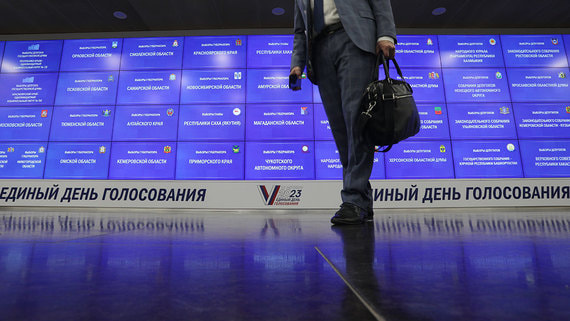Lieutenant governors leave office after elections
[ad_1]

The rotation of regional officials responsible for domestic policy, which began last summer, continues. The day after the election of the governor of the Pskov region, which was won by the current head of the region, Mikhail Vedernikov, nominated by United Russia (86.3% of the votes), the head of the government apparatus, Stanislav Suslov, left his post. “I served for five years. And I am not renewing the next contract for the period of Mikhail Vedernikov’s second term. If you are interested in the reason, these are health problems, with the cardiovascular system,” the official told Vedomosti.
An interlocutor in the government of the Pskov region said that the head of the apparatus is “responsible for everything” and “little happens without his approval.” An interlocutor close to the regional government, however, said that, despite the position of chief of staff, in fact Suslov “remained a manager.” Domestic policy in the Pskov region is supervised by the vice-governor, St. Petersburg political strategist Alexander Seravin.
In the near future, the acting first deputy governor of the Krasnoyarsk Territory, head of the governor’s administration, Sergei Ponomarenko, will leave the civil service, two interlocutors close to the regional government tell Vedomosti. Ponomarenko has been working in this position since 2012, when Lev Kuznetsov, a member of Alexander Khloponin’s team, was governor. Acting head of the Krasnoyarsk Territory Mikhail Kotyukov (won the elections held on September 10 with a result of 70.22%, ran from United Russia) is the fourth head of the region with whom Ponomarenko works. According to the interlocutor, Ponomarenko will go into business. His post may be taken by one of Kotyukov’s former subordinates in the Ministry of Education and Science (the acting governor headed the department from 2018 to 2020).
He received the lowest result among the acting governors in the elections, notes political scientist Vitaly Ivanov. “Ponomarenko is one of the best vice-governors in politics. He just had a brilliant campaign. For example, he won elections to the city council, which in the two previous cycles was enchanted for United Russia,” says political scientist Evgeniy Minchenko.
Vedomosti sent a request to the government of the Krasnoyarsk Territory.
Another official responsible for domestic policy, Vice-Governor of the Primorsky Territory Anton Voloshko, is highly likely to leave his post in a month and a half. “United Russia” nominated him for the by-election of a deputy of the regional legislative assembly in single-mandate electoral district No. 21, which will be held on October 29. Danil Samovidov (“A Just Russia – For Truth”), Olga Sidorenko (Communist Party of the Russian Federation) and Andrei Fedotov (LDPR) will also take part in them.
Voloshko’s participation in the elections may be connected with the upcoming change of senator from the Primorye government. United Russia Governor Oleg Kozhemyako (re-elected on September 10 with a result of 72.78%) did not nominate the current member of the Federation Council, 76-year-old Svetlana Goryacheva, to extend her powers. The three candidates for senator from Kozhemyako included Chairman of the Primorye Legislative Assembly Alexander Rolik, Chairman of the regional government Vera Shcherbina and Deputy of the Legislative Assembly Alexander Zakharov. On July 27, Kommersant reported that, most likely, Rolik would be appointed to the Federation Council. He did not answer Vedomosti’s call, and his representative was unable to comment on the possible appointment. Kozhemyako’s press secretary Makar Rudenchik did not answer the corresponding question from Vedomosti.
Probably, if Rolik transfers to the Federation Council, Voloshko will take the post of chairman of the Primorye Legislative Assembly. According to political scientist Vitaly Ivanov, Voloshko “has long wanted greater status.” “Perhaps his election as speaker is a step towards a future governorship,” the expert suggested.
Any rotation in the position of deputy governor for domestic policy is, first of all, a possible assessment of the results of the campaign, not only those results that were officially obtained, but also in terms of turnout, says political strategist Roman Smirnov. “Many assess the past campaign as a warm-up, preparatory to the presidential elections. In difficult economic and internal political conditions, holding elections is not an easy task,” he said.
[ad_2]
Source link








